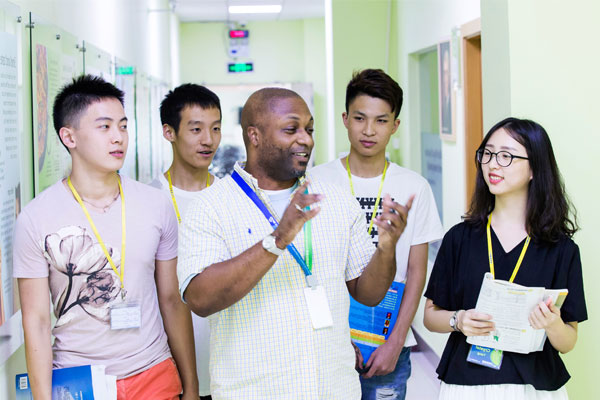出国面签,口语不过关,
面试官的脸说黑就黑!
国际贸易,沟通不顺畅,
天价订单说飞就飞!
人在职场,英语不行,
升职加薪无望!
封闭式管理,纯英语环境,采用『浸泡式』学习法,
按测试水平入学分班,小班教学。
英语是唯一的
校内通行语言,力求每位学员在较短的时间
内真正
内化英语,实现流利英语脱口而出的梦想。
“与世隔绝”,Sorry!
这段时间我只与英语作伴!
衣食住学 English Only,
听说训练满分 Get!
纯英语环境,
厨房大叔和清洁阿姨都能飚英语!
 名中外教,打造国际文化氛围!
名中外教,打造国际文化氛围!
具备丰富教学经验的外教团队,
教师来自十几个国家,均持有外国专家证书及 TESOL 国际教师资格证,
融英语教学于生活, 营造浓郁国际文化氛围,
让您在这小小的联合国中尽情享受异国风情和多元文化交融之体验。

|

|

|

|

|
了解更多国际师资

时间:2019-05-12 14:41:08
来源:平和英语村 作者:Myron Chen

Here are 20 ways to respond when someone thanks you:
下面是20种回答别人的感激的方法:
“不客气”的20种说法
You're welcome!
You're very welcome!
These can be used with anyone, but they are a little bit formal. They can be used for helping someone with something (easy or difficult) or giving gifts. You can also use "quite" or "truly" instead of "very".
这两个可以对任何人说,但是他们有一些正式。如果别人感谢你是因为你帮他们做了什么或者给了他们什么礼物,你可以用“You're (very) welcome!”。你也可以用“quite”和“truly”来代替“very”。
No problem!
Not a problem!
No problem-o!
It's no trouble!
It was nothing!
These are casual ways to say "you're welcome", but you can still use them in most formal situations. They are usually used when the task was relatively easy, like holding the door for someone, or you want to make it sound like the task was easy.
这几个是“you're welcome”的比较日常的版本,但是在很多正式场合你也可以用它们。通常,这些说法用在被感谢的事情比较容易的情况下。比如,你帮人扶了一下门。或者如果你想让别人感觉你帮的忙对你来说很容易。
No worries!
"No worries" is also a casual phrase used when the task was relatively easy. It basically means "don't worry about the effort I put into this task" or "don't worry about thanking me".
“No worries”也是日常生活中常用的。通常在所帮助的事情不太难的时候使用。它的本意是“别担心我在这件事中的付出”或者“别担心感谢我的事儿”。
Anytime!
This is another casual way to say "you're welcome", but it also has the implication that you would be willing to do that task for the person again. It's a great way to let people know you are there for them.
这是另一个日常的“别客气”。而且它还告诉感谢你的人下次你还会帮他。
Not at all!
"nod-dad-dall" (North American pronunciation) This is a polite way to tell someone that being thanked isn't necessary.
很礼貌的办法告诉别人”不必感谢我“。
Don't worry about it!
Don't mention it!
These phrases are similar to "no problem", "no worries", and "not at all". They mean that thanks aren't necessary.
这几个和”no problem“,”no worries“还有”not at all“差不多,都是”感谢我没必要“的意思。
My pleasure!
It was my pleasure!
With pleasure!
These are the most formal phrases on this list. They indicate that you enjoyed helping the other person. They could be used for an easy task like opening the door or a more difficult task like helping someone with a task at work. They could also be used when giving gifts.
这几个这个列表里最正式的啦。无论是开门儿这样的简单事儿还是帮人完成一个大工程,或者给人礼物,你要你想让自己听起来很正式,就尽管用。
I'm happy to help!
Anything for you!
Anything to make you smile!
These phrases are a casual way to say you're welcome. They can be used when the task was relatively difficult, like helping someone solve a problem at work or lending money. "Anything to make you smile" can be used when giving a gift, especially an unexpected gift.
这几个有比较日常了。通常在任务比较难的时候用,比如借钱。”Anything to make you smile“还可以在送礼物的场景中使用,尤其是给人惊喜的礼物。
You'd've done the same for me!
You would have done the same for me. Although it's not an official contraction, this phrase is usually shortened into "you'd've" in spoken English. This means "helping you is not a big deal to me because I know you would help me if I were in the same situation." It's used when helping someone with a task or when lending money.
这是一个约定俗成的连读形式,原文是“You would have done the same for me”。它的意思是“帮助你没什么,因为我知道你在同样的情况下也会帮助我”。通常用在困难场景中或者借钱场景中。
No, thank YOU!
This phrase means that the person you helped also helped you.
这句话是说感谢你的那个人其实也帮助了你。
The reason I recorded this lesson is once a student told me she said "it's my pleasure!" after the proctor said "Thank you!" when she handed in her IELTS exam. She was lucky it didn't happen during her oral exam. You say "it's my pleasure" only when somebody has benefited from what you've done, which in this situation the proctor didn't. I would suggest "you're welcome", "no problem" or "no, thank YOU!"
我录这节课的原因是一个学生告诉我她交雅思考卷的时候对考官说”it's my pleasure!“。她很幸运!因为她不是在进行口语考试。通常只有当你真的给了对方一些好处的时候你才能说”it's my pleasure“,雅思考官显然没有从你交卷中得到直接的好处。这个情况下,我建议你说”you're welcome“,”no problem“ 或者 ”no, thank YOU!“
I can't tell you how to use these phrases in every single situation that someone might say "thank you", so if you have questions about what to use in a specific situation, please ask me in the comments.
我没办法告诉你使用这些短语的所有的情况。所以,如果你想知道在某些具体的场景中应该如何说”不客气“,请留言问我吧!

